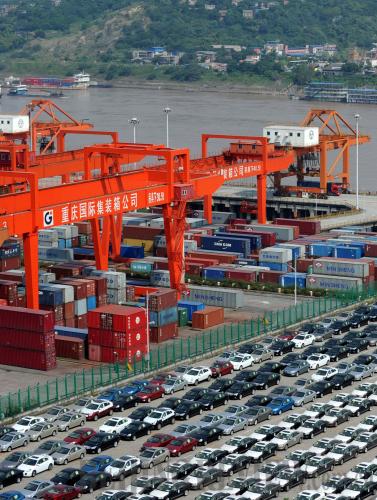|
 |
|
FOREIGN TRADE SLOWDOWN: The Lianglu Cuntan Bonded Port Area in southwest China's Chongqing (LI JIAN) |
Furthermore, money collected from personal income tax dropped 8 percent in 2012, while the individual business income tax declined 12.5 percent during the period, according to the State Administration of Taxation.
The government has stepped up tax reduction efforts over recent years in a bid to buoy the economy. In 2011, it raised the income tax exemption threshold for wage-earners and those owning individual businesses.
"China's growth opportunities have changed. Domestic consumption has replaced external demand to become a new means of economic growth," said Lian Ping, chief economist of Bank of Communications.
"Alongside the fast development of per-capita GDP, urbanization and the country's central and western regions, a new window has been opened for China's economic growth."
To unleash the potential of domestic consumption, the country should improve income distribution and its social security system, which would ease the effect of sluggish exports on China's economy, said Lian.
"China should make further reforms on its income distribution system to enhance the proportion of residents' income against national income," said Li Wei, Director of the Development Research Center of the State Council, at the Forum on China's Economic Outlook held in Beijing on December 29, 2012.
"This will lead to an increase in the purchasing power of the general public, especially among the middle- and low-income groups,"
Also, the government should establish a better social security system that covers both rural and urban areas, to make people feel more secure about spending, said Li.
China's exports and imports totaled $3.87 trillion in 2012, up 6.2 percent, according to the General Administration of Customs (GAC).
The growth rate slowed sharply from the 22.5-percent rise registered in 2011 and also missed the government's 10-percent target set for 2012.
"Although this number missed the government's target, China's foreign trade performance still tops the world and is the best among all economies in the world," said Zheng Yuesheng, spokesman of the GAC.
"During the first 10 months of 2012, Japan's imports and exports only expanded 1.1 percent, the EU's trade volume shrank 2.12 percent and that of the United States rose by only 4.2 percent. China's robust 6.2-percent increase is a hard-earned result and it has marked progress in the quality, structure and efficiency," said Zheng.
The slowdown of foreign trade growth is a result of sluggish external demand, rising production costs at home and increasing trade protectionism in other countries, Zheng said.
Four years after the onset of the global financial crisis, the world economy remains fragile and growth in high-income countries is weak, says the World Bank in the newly released Global Economic Prospects report.
"The economic recovery remains fragile and uncertain, clouding the prospect for rapid improvement and a return to more robust economic growth," said World Bank Group President Jim Yong Kim.
The demographic dividends and the gains of China's entry to the WTO have been watered down, said Liu Ligang, an economist at ANZ National Bank Ltd. In the long run, foreign trade will no longer pump as much steam into the country's economic growth as it used to.
| 